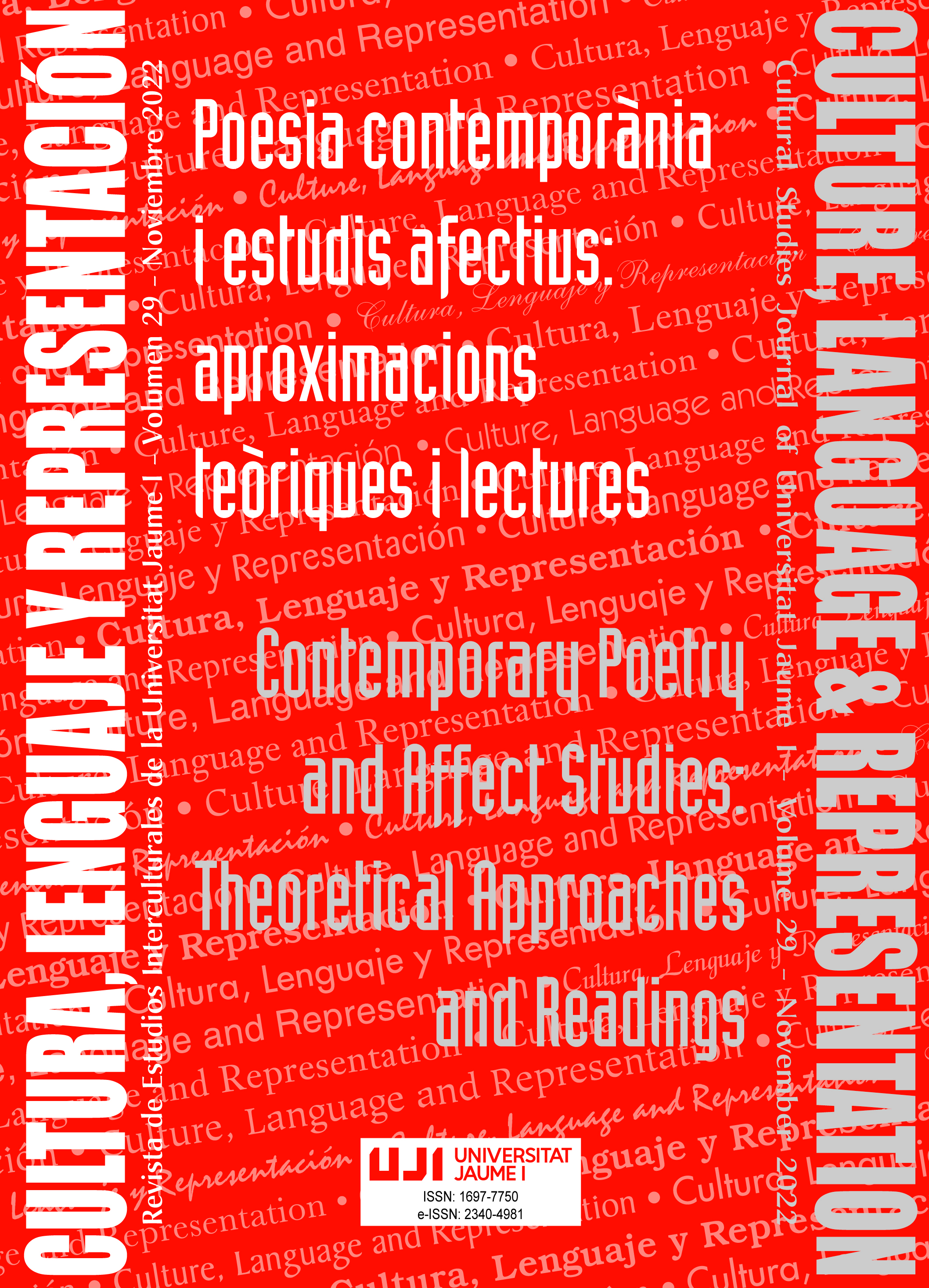Guilt and Ecocriticism: new poetic representations for the antrophogenic crisis in Mireia Calafell, Núria Mirabet and Silvie Rothkovic
Main Article Content
Abstract
As a result of the intersection with biology, philosophy, and anthropology, psychology has generated a valuable theoretical corpus on the theory of affect and emotions in a context where the subject faces a permanent biosphere crisis. Scholars such as Melanie Klein (1998, 2001) and Lawrence Buell (2016) agree in distinguishing between depression and fear as immediate emotions in adversity. However, we note that in recent years so-called outlawed emotions (Jaggar, 1989), such as hatred, envy, shame, or guilt, have also played a decisive role in interpreting moments of crisis. Among these emotions, guilt is the one that has generated the most literature so far and the one that, according to traditional psychology, harms the subject the most (Freud 1923). Still subject to rigid gender stereotypes, guilt is characterized by its negative impact on the psyche and the ability to activate adaptive mechanisms concerning moral and social behaviour (Barret, 1995; Eisenberg, 1986). Given these characteristics and the fact that in modern subjectivity it no longer fits only within the limits of the individual self, this article will explore the new poetic figurations of guilt in the anthropogenic era. Thus, from the analysis of a selection of poems from Nosaltres, qui (2020) by Mireia Calafell, Lianes o les rates que imiten l’Esther Williams (2021), Núria Mirabet and Als llacs (2021), Silvie Rothkovic, I will study how ecohumanism manifests itself in the poetic imagination when faced with destruction, extinction, and irreversibility narratives.
Downloads
Article Details
An open-access CREATIVE COMMONS copyright license is used. Those authors whose works are published by this journal, accept the following terms:
- Authors will retain their copyright and guarantee the Journal the right to first publish their work, which will simultaneously be subject to the Creative Commons Recognition License CC BY SA that allows third parties to share the work, provided that its author and first publication is indicated.
- Authors may adopt other non-exclusive license agreements for the distribution of the published version of the work (e.g., deposit it in an institutional telematics file or publish it in a monographic volume) provided that the initial publication in this journal is indicated.
- Authors are allowed and recommended to disseminate their work over the Internet (e.g. in institutional telematics files or on their website) before and during the submission process, which can produce interesting exchanges and increase quotes of the published work.
Funding data
-
Ministerio de Ciencia e Innovación
Grant numbers PID2019-105083GB-I00/ AEI / 10.13039/501100011033
References
Barret, Karen Caplovitz. 1995. A functionalist approach to shame and guilt. En Self-conscious emotions, ed. June Price Tangney i Kurt W. Fischer. Nova York: The Guilford, 25-63-
Bate, Jonathan. 2002. The Song of Earth. Harvard: Harvard University Press.
Bennet, Jane. 2010. Vibrant Matter. A Political Ecology of Things. Durham i Londres: Duke University Press.
Braidotti, Rosi. 2017. «Critical Posthuman Knowledges», South Atlantic Quarterly, 116(1): 83-96.
Buell, Lawrence. 1996. The Environmental Imagination: Thoreau, Nature Writing and the Formation of American Culture. Harvard: Harvard University Press.
Buell, Lawrence. 2016. «Anthropocene Panic: Contemporary Ecocriticism and the Issue of Human Numbers». Frame 29(2): 1-5. https://dash.harvard.edu/handle/1/32192699
Calafell, Mireia. 2020. Nosaltres, qui. Barcelona: LaBreu.
Christensen, Inger. 2000 [1981]. Alphabet. Trad. Susanna Nied. Nova York: New Directions Books.
Csiki Helg, Kristina. 2019. Exploring the Places that Language and Nature Converge. Ethics and Aesthetics in Jody Gladding’s Poetry. Lund: Lund University.
Deleuze, Gilles. 1994. Difference and Repetition. Columbia: Columbia University Press.
Eisenberg, Nancy. 1986. Altruistic emotion, cognition, and behavior. Londres: Psychology Press.
Etxebarría, Itziar. 2000. «Guilt and Emotion under Suspicion». Psichothema, 12: 101-108.
Freud, Sigmund. 1976 [1923]. «El yo y el ello», en Obras Completas, vol. XIX. Buenos Aires: Amorrortu, 1-67.
Glotfelty, Cheryll (1996). «Introduction: Literary Studies in an Age of Environmental Crisis». En Cheryll Glotfelty i Harold Fromm, The Ecocriticism Reader. Atenes i Londres: The University of Georgia Press, xv-xxxvii.
Hiltner, Ken.2014. Ecocriticism: The Essential Reader. Abingdon: Routledge.
Jaggar, Alison. M. 1989. «Love and Knowledge: Emotion in Feminist Epistemology », Inquiry 32(2): 151-176.
Klein, Melanie. 1998. Love, Guilt and Reparation and Other Works 1921-1945. Londres: Virago Press.
Klein, Melanie. 2001. Envy and gratitude: a study of unconscious sources. Abingdon, Oxon: Routledge.
Massumi, Brian. 2015. Politics of Affect. Cambridge, UK; Malden MA: Polity.
Mirabet, Núria. 2021. Lianes o les rates que imiten l’Esther Williams. Barcelona: Trípode.
Nicholsen, Shierry Weber. 2004. The Love of Nature and the End of the World: Unspoken Dimensions of Environmental Concern. Cambridge, MA: MIT Press.
Pons, Margalida. 2020. «Emocions proscrites: escriptura, gènere, afectes i algunes veus de la poesia catalana contemporània». 452F Revista de Teoría de la Literatura y literatura comparada, 22: 39-59. https://revistes.ub.edu/index.php/452f/article/view/29168/30925
Ronda, Margaret. 2020. «Affect and Environment in the Contemporary Ecopoetics ». En Affect and Literature, ed. Alex Houen. Cambridge: Cambridge University Press, 337-354.
Rothkovic, Silvie. 2021. Als llacs. Barcelona: LaBreu.
Rothkovic, Silvie i Jan Garrido. 2021. Hotel Iglú. Autoedició. https://sonsdexaloc.com/nunavut-ens-refugia-a-lhotel-iglu/ (darrer accés 13.04. 2022).


